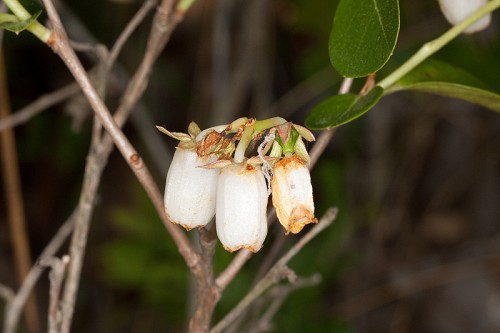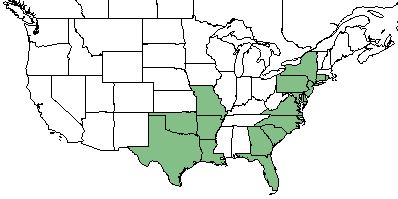Lyonia mariana
Common names: piedmont staggerbush[1]
| Lyonia mariana | |
|---|---|

| |
| Photo by the Southeastern Flora Database | |
| Scientific classification | |
| Kingdom: | Plantae |
| Division: | Magnoliophyta - Flowering plants |
| Class: | Magnoliopsida - Dicots |
| Order: | Ericales |
| Family: | Ericaceae |
| Genus: | Lyonia |
| Species: | L. mariana |
| Binomial name | |
| Lyonia mariana L. | |

| |
| Natural range of Lyonia mariana from USDA NRCS Plants Database. | |
Contents
Taxonomic Notes
Synonyms: Neopieris mariana (Linnaeus).[2]
Varieties: none.[2]
Description
L. mariana is a perennial shrub of the Ericaceae family that is native to North America.[1] It is distinguishable by broadly elliptic leaves that grow at an upward 45-degree angle and bright pink axillary buds.[2]
Distribution
L. mariana ranges from Rhode Island and New York, south to the central peninsular and east Panhandle Florida. There are disjunct populations west of the Mississippi River in southcentral Missouri, central Arizona, northwestern Louisiana, southeastern Oklahoma, and eastern Texas.[2]
Ecology
Habitat
Common habitats for L. mariana are pine flatwoods, savannas, pocosin-sandhill ecotones, and dry sandy woodlands.[3] These habitats largely occur in the Atlantic and Gulf Coastal Plain, Eastern Mountains, Great Plains, and the Northcentral and Northeast of the United States.[1] Specimens have been collected from habitats including dry sand oak woodland, pine flatwoods, thickets, dry sands in pine woodlands, wet flatwoods, dry sands near small ponds, cypress swamp edges, lakeside sand ridges, and pine palmetto flats.[4]
Phenology
Lyonia mariana has been observed to flower from April to August, with peak inflorescences in May.[5]
Pollination and use by animals
Lyonia mariana is visited by long-tongued bees from the Apidae family such as Nomada ovata.[6]
Conservation, cultivation, and restoration
L. mariana has been classified as endangered in Pennsylvania, special concern in Connecticut, and historical in Rhode Island.[1]
Cultural use
Photo Gallery
References and notes
- ↑ 1.0 1.1 1.2 1.3 USDA Plant Database
- ↑ 2.0 2.1 2.2 2.3 Weakley, A.S. 2015. Flora of the southern and mid-atlantic states. Working Draft of 21 May 2015. University of North Carolina at Chapel Hill, Chapel Hill, North Carolina.
- ↑ Weakley, A. S. (2015). Flora of the Southern and Mid-Atlantic States. Chapel Hill, NC, University of North Carolina Herbarium.
- ↑ URL: http://herbarium.bio.fsu.edu. Last accessed: June 2018. Collectors: R.K. Godfrey, Walter S. Judd, Kent Perkins, Scott Zona, Wilson Baker, Loran Anderson, Howard Home, K. Craddock Burks, George Cooley, R.J. Eaton, James D. Ray Jr., R.D. Houk, Sidney McDaniel, Gwynn W. Ramsey, Richard Mitchell, C. Jackson, Elias Potagas, K Lems, Robert Kral, R. A. Norris. States and counties: Florida (Leon, Taylor, Jefferson, Taylor, Franklin, Seminole, Madison, Gadsden, Putnam, Volusia, Wakulla) Georgia (Thomas)
- ↑ Nelson, G. PanFlora: Plant data for the eastern United States with emphasis on the Southeastern Coastal Plains, Florida, and the Florida Panhandle. www.gilnelson.com/PanFlora/ Accessed: 19 MAY 2021
- ↑ Discoverlife.org [1]